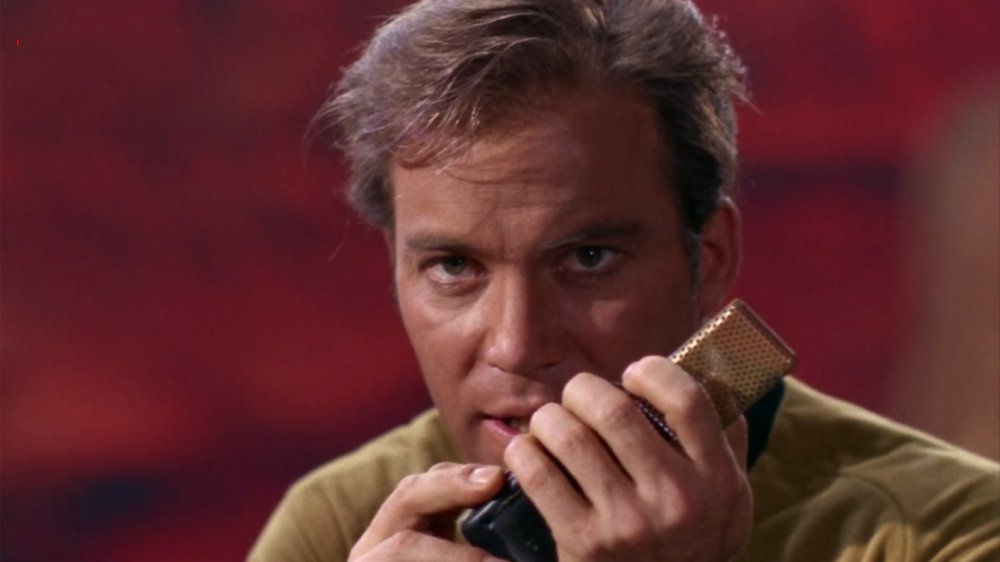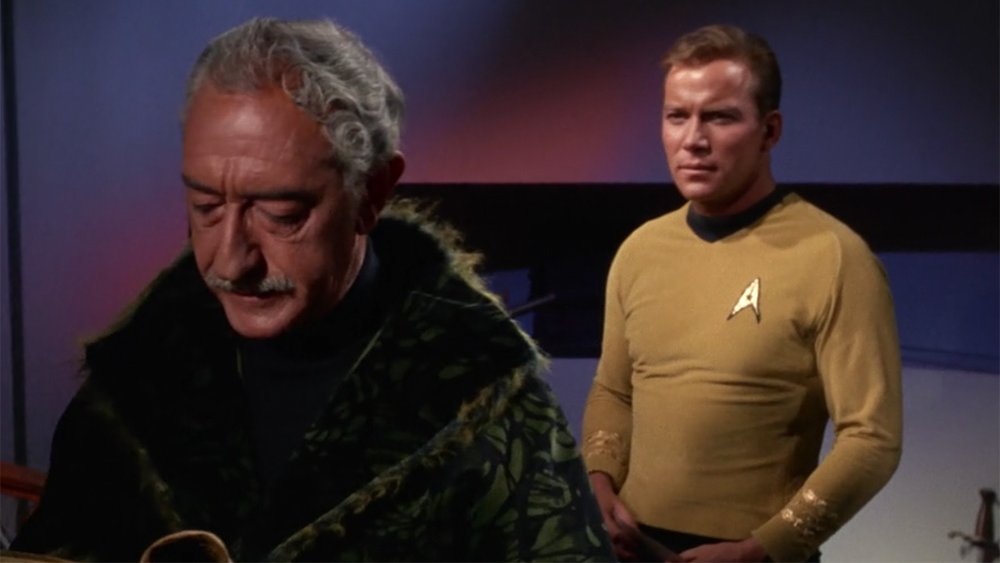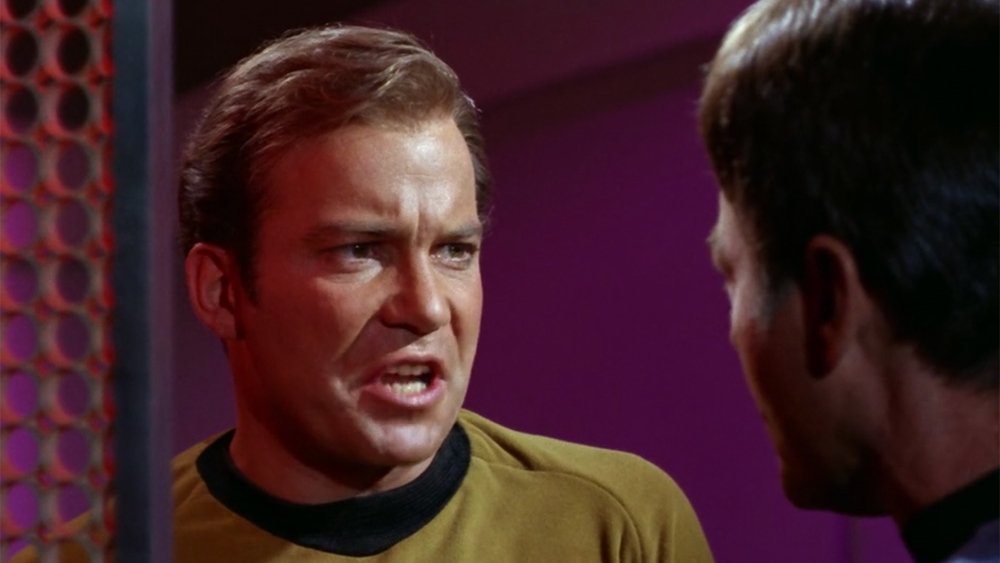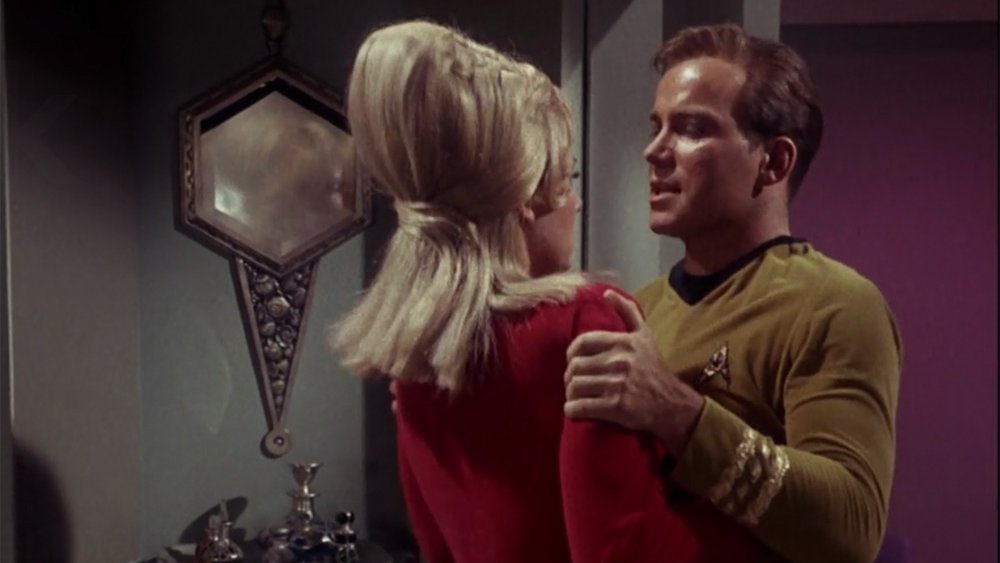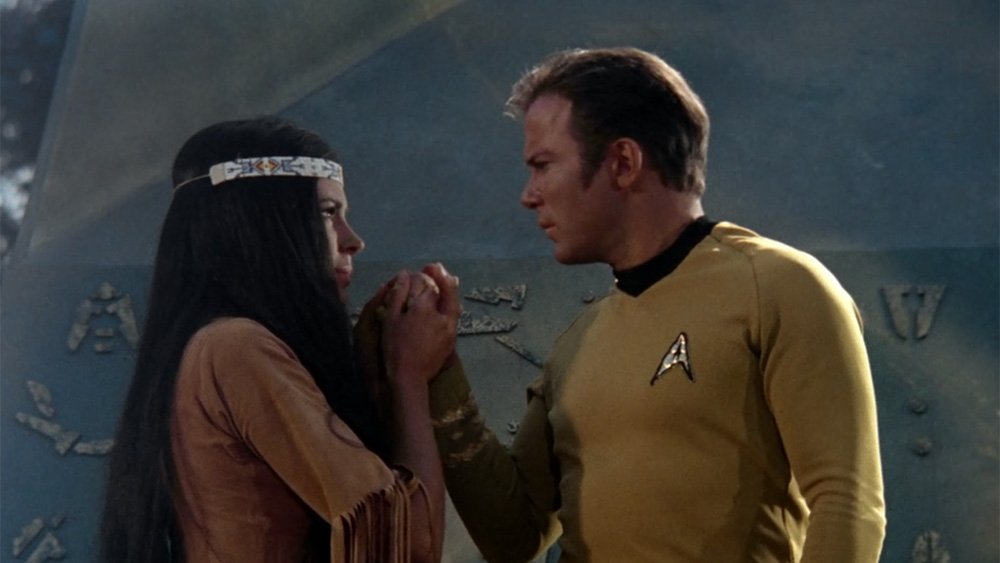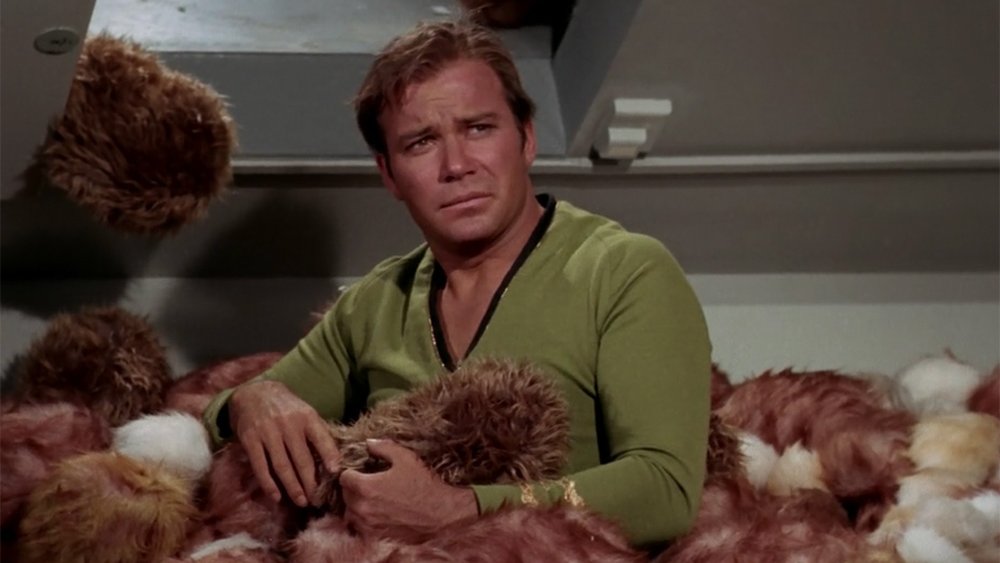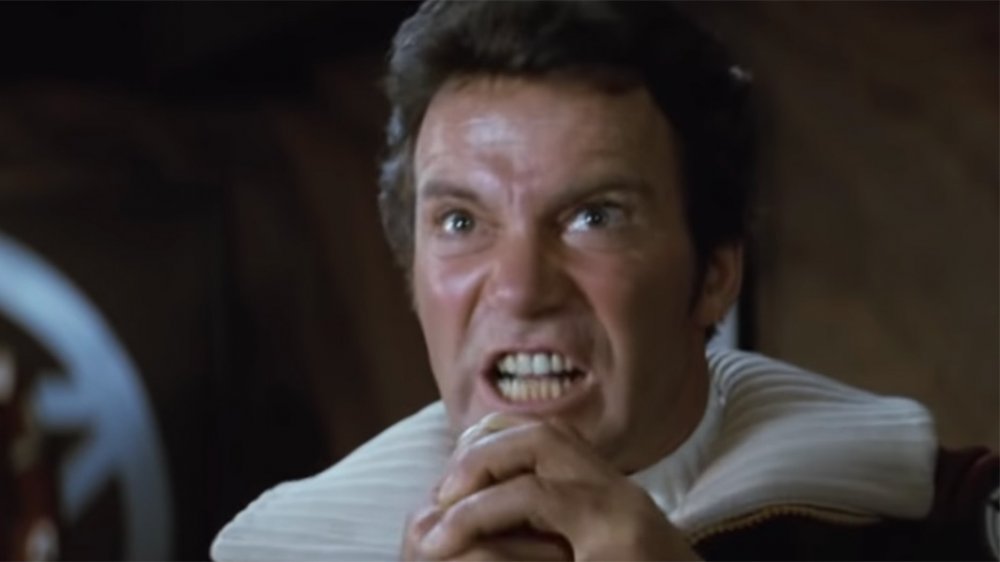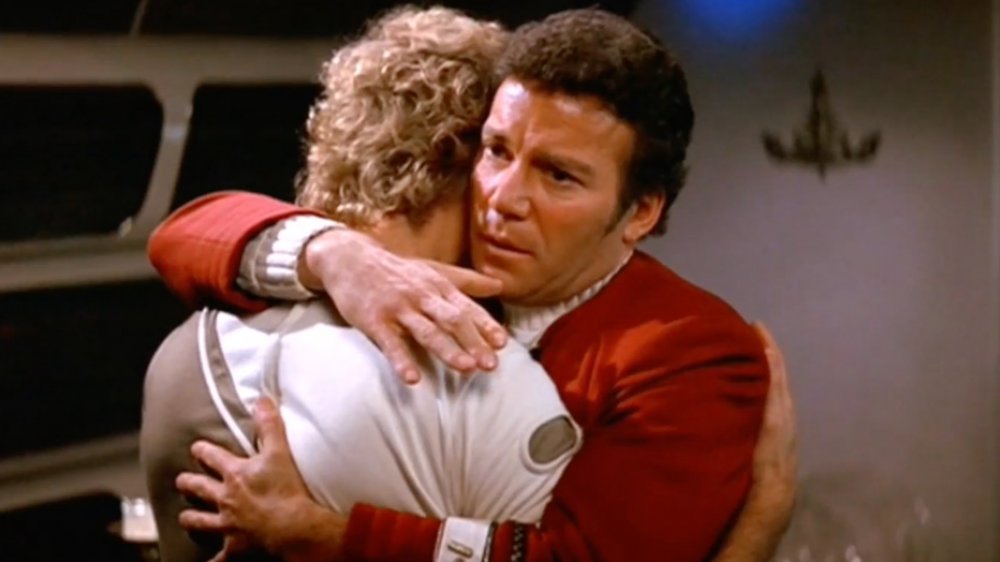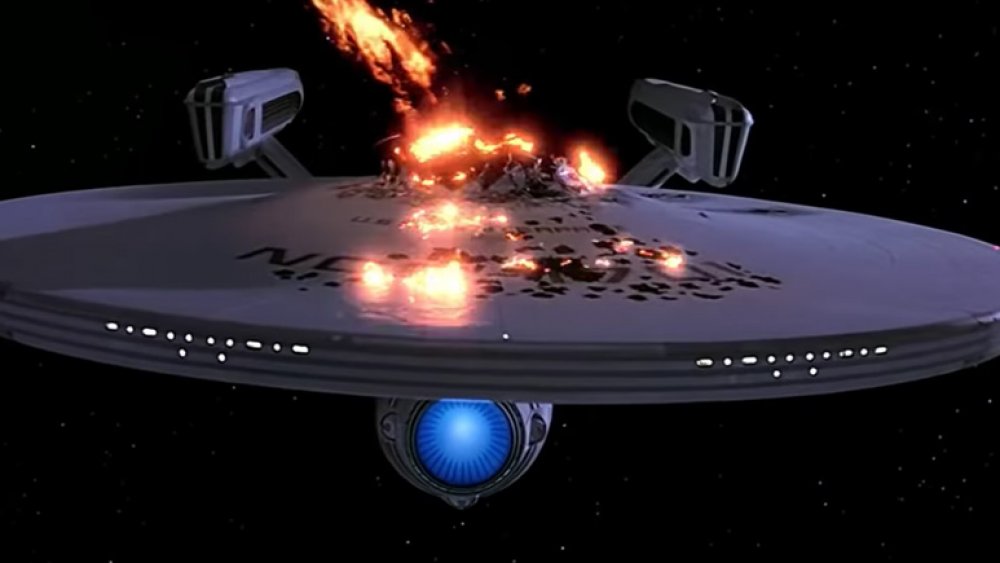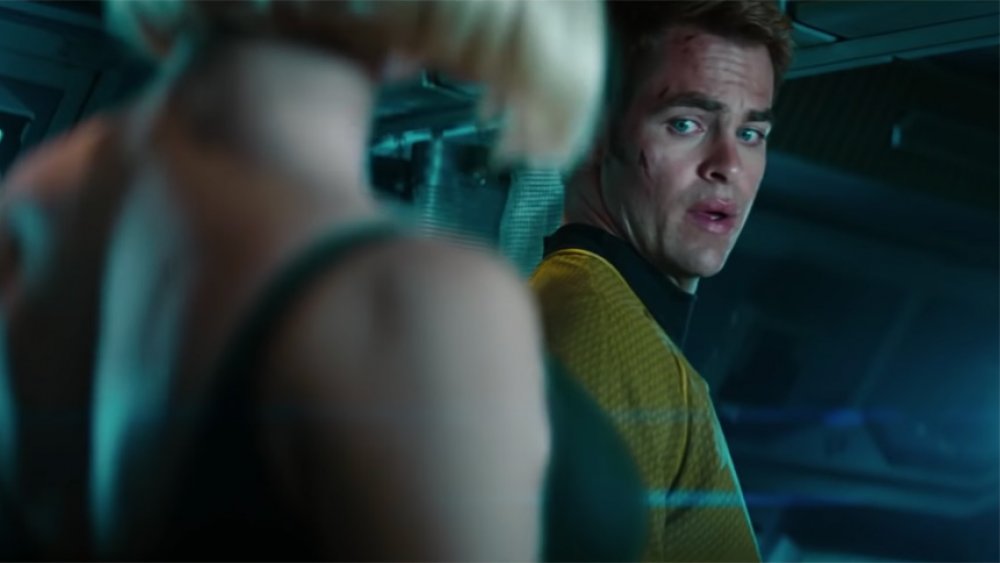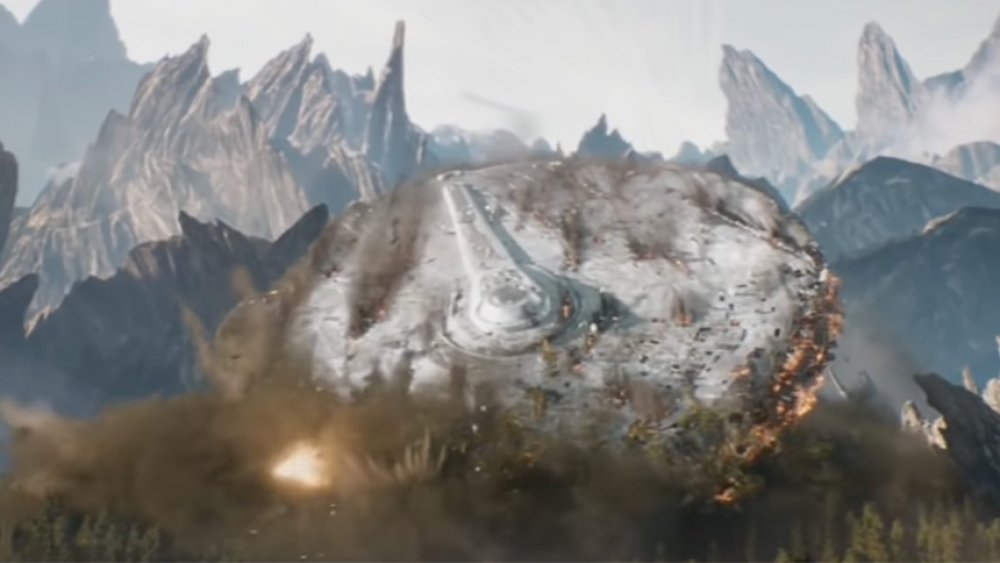The Worst Things Captain Kirk Has Ever Done
Archer. Picard. Sisko. Janeway. That guy who played Lucius Malfoy in Harry Potter. The names of Starfleet's greatest captains have been etched into future history over the course of the Star Trek franchise, but one name towers above them all: James Tiberius Kirk of the starship Enterprise. Sure, you might have your favorite, but as the commanding officer during the original run of the Star Trek TV series, not to mention a full ten films spread across two alternate realities that saw an aging William Shatner morph into a hunky Chris Pine — a glow-up we can all be jealous of — Kirk has done it all.
Of course, "all" doesn't always mean "good." If you look past those grandiose heroic moments, you'll find that Kirk's lauded career is full of truly terrible actions on virtually every level. From a devastating round of biological warfare that led to the extinction of an entire species to just plain not being a very good dad, here are the worst things that Captain Kirk has ever done.
Murderer most foul
While we only ever got to see three years of his tenure as the commanding officer of the Enterprise on the original TV show, there are several references made to Captain James Tiberisu Kirk's long and notable history with Starfleet throughout the series. One of the most interesting comes in season 1's "The Conscience of the King," where we find out that years before he had his own command, he was one of nine eyewitnesses to the massacre of over 4,000 colonists by their governor, Kodos.
The good news is that Kodos was believed to have died during the altercation that followed. The bad news is that he actually didn't die at all and instead went into hiding, becoming a famous Shakespearean actor whose performance of Macbeth was renowned throughout the galaxy. That's not exactly a low profile, so he probably shouldn't have been surprised when Kirk showed up during one of his performances after being tipped off by someone else who'd been present for the massacre — and who was murdered shortly thereafter, a fate suffered by most of the other witnesses — that Kodos was still alive. So, what does Kirk do with the information that this devious psychopath with a body count of at least 4,007 is still out there and may still be actively murdering?
He invites him onto the Enterprise. You know, where all of his coworkers and friends live, including one of the other witnesses? Shockingly, this directly results in two more attempted murders and one that actually happens when Kodos himself is phasered to death by his own daughter on stage in front of an audience. The big twist? Kodos wasn't the one murdering the witnesses. It was his daughter doing that so that he'd never be caught. Kirk, by the way, also invited her onto the Enterprise, and of course tried to seduce her while investigating her dad for mass murder. That might not be as morally awful as some of the other things Kirk has done, but it's definitely very weird.
Moby Jerk
Another piece of Kirk's past that comes up during the run of the original series forms the background for season 2's "Obsession," which involves Kirk being... obsessed. You probably saw that one coming.
The object of said obsession was a cloud of deadly, vampiric space gas that Kirk had previously encountered in his pre-Enterprise days when he was serving on board the USS Farragut. Back then, he'd hesitated rather than destroying the creature, leading to the captain and half of the crew being, to quote Spock, "annihilated." That regret leads the crew into a sort of ersatz Moby Dick as Kirk diverts the ship from its mission in an effort to track it down and kill it. His quest for vengeance ultimately winds up with a total of six members of the crew (including Spock) getting their blood sucked out, three of whom die from it. In fact, the only reason Spock survives is that this particular misty Dracula prefers human hemoglobin to the Vulcans' infamous green blood.
At one point, it gets so bad that McCoy and Spock attempt to relieve Kirk of his command, and for good reason. The crew of the Enterprise are dedicated their mission and willing to risk their lives in battle or in the name of exploration. Getting exsanguinated to death because the captain is obsessively fixated on an evil space fart, however, is a pretty big ask for anyone.
Prepare for trouble, and make it double
If there's one thing Star Trek loves, it's evil duplicates. The introduction of the Mirror Universe in the original series is arguably the show's most significant contribution to the language of pop culture — especially in the way that Spock's infamous goatee became a visual signifier of an evil twin — and the trend continued as the franchise revisited it time and time again. Plus, we got Data's bad brother Lore and Riker's transporter malfunction twin on The Next Generation, and while the latter wasn't necessarily "evil" in that first appearance, he did show up on Deep Space Nine to steal a spaceship and use it in a terrorist attack.
Before the Mirror Universe, however, Kirk had another experience in doubled troubles when a transporter accident — lot of those going around — split him into two different Kirks. Naturally, one was good and one was evil, and when we say "evil," we mean it. Bad Kirk sexually assaults Yeoman Janice Rand in a scene that's still genuinely harrowing and upsetting to watch over 50 years later, and she only escapes when she scratches his face, giving the audience a convenient way to tell them apart. It is, on a very visceral level, the worst thing viewers ever saw Kirk do, and it's worth remembering that this wasn't a Mirror Universe version. This was a part of the real Kirk, a terrible piece of his personality that was always in there, and would be once it was added back to the whole, which is a very disturbing plot point to contemplate.
Here's the thing, though: the other half, Good Kirk? He also sucked, just in a completely different way. He wasn't running around trying to force himself on members of the crew, but he was weak-willed, indecisive, and easily manipulated. Bad Kirk even takes advantage of his counterpart's spineless nature to escape and attempt to assault Rand again. The worst part? The entire point of the episode is that Kirk actually needs both sucky halves of his personality to function as a human being, with McCoy even saying that Bad Kirk isn't actually bad, "just... human." That's a rough diagnosis, doc.
"The Paradise Syndrome"
So far, we've mostly focused on bad decisions that Kirk made as the captain of the Enterprise, but when you're dealing with fictional characters, there comes a time when you have to stop blaming the character and chalk it up to the people behind the camera. Such is the case with "The Paradise Syndrome," which marks some of Captain Kirk's worst moments. And by "moments," we mean the entire episode. All of it.
The premise, which takes so many leaps of logic that it's a wonder Spock's head didn't explode just from being part of of it, involves Kirk falling down a hole and getting amnesia on a previously uncharted planet. When he wakes up, he discovers that the planet is populated entirely by the cartoonishly stereotypical descendants of Native Americans, who immediately begin to worship Kirk as a god and put him in charge of everything. Needless to say, none of the actors were actually Native Americans. The kicker comes when it's revealed that the reason they're out in the depths of space is that a bunch of aliens abducted them from Earth and transplanted them to what was essentially a planetary reservation, where they could thrive as the embodiments of the old "Noble Savage" cliché.
So, yeah: Kirk shrugging his shoulders and accepting that he's being worshiped as a god is a bad move on his part, but the real fault for this one goes with writer Margaret Armen for cooking this whole thing up. On the bright side, she also wrote "The Gamesters of Triskelion," and that episode rules.
Tribble-based warfare
"The Trouble with Tribbles" is remembered as one of the most fun episodes of Star Trek, and for good reason. It introduces the iconic furballs and their tendency to breed exponentially, gives viewers the best bit of physical comedy in the show's entire 79-episode run when Kirk is buried in a pile of them, and even manages to tie its goofy plot in to the oh so serious looming threat of war with the Klingons. It's a fun, lighthearted romp that everyone can enjoy.
Unless you start thinking about what happens after the credits roll, that is. In order to rid the Enterprise of its Tribble problem, Kirk and his crew beam them over to a departing Klingon ship. Considering that there's a very real (if comedic) threat to the Enterprise from the Tribbles overbreeding and gorging themselves on both the ship's stores and an entire planet's food supply, this act is essentially dooming the Klingons and the Tribbles aboard their ship. The Tribbles are said in the episode to reproduce so prodigiously that a single Tribble can potentially have 100,000 descendants in about two days, so there's no way the Klingons' food supply is going to survive more than a few minutes. Think about it for even a second, and you'll come to the same grisly conclusion we did: either the Tribbles eat the Klingons, or the other way around.
This isn't just conjecture, either. In an episode of Deep Space Nine, which takes place about a century after "The Trouble with Tribbles," there's a mention of "The Great Tribble Hunt," in which the Klingon Empire eradicated the entire species from the galaxy after they became an ecological threat of cosmic proportions. It's unclear whether outer space is subject to the Geneva Conventions, but that kind of devastating biological warfare should probably be brought up at Kirk's next evaluation.
Buried ahliiiiiive
In retrospect, it's a little weird that so much of what happens in the Star Trek movies is based around Kirk getting his buddies back together to fix all the stuff he screwed up two decades earlier. It's like the nightmare version of having to apologize to everyone at your high school reunion for being a jerk. In space. And also there are torture-worms involved.
The prime example (and the best of the Trek films) comes, of course, from "Space Seed." This episode from the second season of the original TV series wound up getting a direct sequel on the big screen in 1982's Star Trek II: The Wrath of Khan. In the original episode, Kirk discovers a frozen tyrant who's really into eugenics, and who decides to take over the Enterprise as his first step towards conquering Earth. Kirk's reaction to this genetically engineered Rita Repulsa who literally tried to murder him via slow exposure to the vacuum of space? He just drops him and his pals onto Ceti Alpha V, rewarding him with an entire planet to "tame" and assuming that this decision will never come back to bite him.
Surprise! 15 years later, it all comes back to bite him in a truly staggering example of what happens when you mix overconfidence, gross negligence, and a tendency to piss off everyone around you. It turns out that leaving a murderous genetic superman with an intense thirst for revenge alone on his own planet with what are basically unlimited resources and an easily exploited workforce is a singularly terrible idea. Even worse, nobody bothered to check on Khan at all, despite the fact that Kirk put him on trial for his crimes, even when the neighboring planet exploded. At the very least, planetary destruction is the sort of thing you'd think Starfleet would keep track of, which raises the question of whether Kirk bothered to report any of this at all. Either way, two sets of horrible decisions 15 years apart lead directly to his best friend dying of radiation poisoning. That's a pretty rough consequence, but given how hard he screwed the tribble on this one, it's the least you can expect.
Deadbeat dad
There's really a litany of Kirk's mistakes leading to the events of Star Trek II, including the first of the movie's big reveals: David Marcus, Kirk's long-forgotten son, who never knew his father, since Kirk decided to boldly go away from any parental responsibilities.
To be entirely fair to Jim T., we learn in the movie that his absence from David's life came at the request of David's mother, Carol. She recognized that both she and Kirk were devoted their careers, and he wasn't about to give up command of a starship on a mission to explore the final frontier, and the accompanying endless stream of sexy robots and half-naked green ladies that went along with it. Rather than co-parenting across parsecs, she told Kirk that she wanted to raise David alone, presumably because being a single mom is a little easier in the 23rd century. With that, Kirk happily went back to the Enterprise, without ever mentioning that he had at least one kid out there. Also, to his credit, once he reconnects with his adult son, Kirk does make an effort. That's something, even if it leads to the most awkward hug of all time.
Okay, now let's stop being fair and get into some real talk. It's totally fine to prefer cruising around the galaxy to being a stay-at-home dad, but if that's your deal, then maybe don't have a kid. We have to assume that by 2250 CE, birth control will have gotten to the point that parenting is purely optional. Or, if you do have a child and you think you might wind up getting real grumpy about it a few years down the line, maybe make the slightest effort to be present in their life rather than just agreeing that your job is way more important and bailing to the beta quadrant. Oh well, what's the worst that could happen? It's not like David's going to grow up wanting to prove something to his absent father and wind up getting stabbed in the chest while trying to wrestle Klingons, right? Right.
Grand Theft Starship
If The Wrath of Khan is about Kirk having to fix his past mistakes, then Star Trek III: The Search For Spock is built around JTK racking up an entirely new set of charges.
Over the course of the film, Kirk not only manages to hijack his former spaceship and speed off on an unauthorized mission to go dig up his best friend's dead body, he also does what the Klingons, the Romulans, and all of the Federation's other enemies never managed to do. He blows up the Enterprise.
Oh, and this also leads directly to Kirk's son getting knifed to death, but let's be real here. David Marcus had only been around since the previous film, and while Kirk spent some time getting mopey and listening to the 23rd century version of "Cat's in the Cradle," the audience didn't really have much of a connection to him. The Enterprise, though? The ship that had carried our crew to all those strange new worlds? That had taken our breath away when we saw it rebuilt in Star Trek: The Motion PIcture? It was a way more important piece of Star Trek than an estranged son, and when it was destroyed, it was Kirk who gave the order.
Peeping Jim
The 2009 Star Trek film rebooted the franchise by shifting everything into an alternate timeline, letting the franchise revisit the characters of the original series while telling new stories that weren't set in stone by the future history of The Next Generation. While most of the characters are the same, there are some huge differences in how the events play out — the planet Vulcan is destroyed, for example, and rather than the militaristic aesthetic of the original Enterprise, everything in the new timeline looks like it's happening in an Apple Store.
Some things, however, are so deeply ingrained in the universe that they persist throughout the divisions between realities, and one of them is the fact that Jim Kirk is a horny sex creep. The rebooted movies present him as a habitual womanizer who can't even be bothered to remember the names of the people he's sleeping with, which actually is a big change. Say what you will about Original Kirk space-seeding his way across the galaxy, but he never seemed like he was emotionally detached.
The worst example comes in Star Trek Beyond, when he meets that timeline's version of Carol Marcus. She asks him to turn around so that she can strip out of her uniform for some reason, only for him to start leering at her over his shoulder after taking a peek. Again, in fairness, he doesn't know she's stripping to her Starfleet skivvies when his curiosity initially gets the better of him, but once he does know, he definitely doesn't look away until she starts to get miffed. That long moment spent ogling her could probably be chalked up to surprise... if he wasn't hitting on her a few seconds before, despite being her superior officer. Who's in charge of HR on the Enterprise these days?
Beyond bad decisions
To put it kindly, Star Trek Beyond is not exactly Kirk's finest moment. In fact, the cascading series of terrible decisions that make up the plot of that film might just represent the worst thing Kirk has done across any timeline.
At the start of the film, Kirk is trying to get a promotion to vice admiral, essentially because he's grown bored of trekking through the stars and wants to quit. Look, there's nothing wrong with wanting to advance your career, but "I don't want to be the captain of a starship and have a bunch of adventures" isn't exactly the most endearing motivation for any character, let alone James T. Kirk. Either way, Kirk's desire to bail on the Enterprise might have been the factor that led his next mission to go so disastrously wrong.
While it's under Kirk's command, the Enterprise is boarded by hostile forces who slaughter most of the crew, with the survivors abandoning the ship before it's destroyed. Maybe next time just go ahead and put in your two weeks notice.
